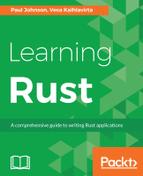As with any other script, Cargo works (by default) on the current working directory. (For example, while writing this chapter, my working directory for the example code is ~/Developer/Rust/chapter0 on the Mac and Linux boxes, and J:DeveloperRustChapter0 on the Windows 10 machine.)
In its simplest form, Cargo can generate the correct file structure like this:
cargo new demo_app_name -bin
The preceding command tells Cargo to create a new structure called demo_app_name, and that it is to be a binary. If you remove -bin, it creates a structure called, which is going to be a library (or more accurately, something other than a binary).
If you don't wish to use the root (say you want to create a library within your binary framework), then instead of demo_app_name, you append the structure before the name relating to your working directory.
In the small example I gave earlier, if I wanted to create a library within my binary structure, I would use the following:
cargo new app_name/mylib
That will create a structure like this:

The Cargo.toml file requires no editing (at this stage), as it contains the information we had to enter manually when we created the project by hand.
